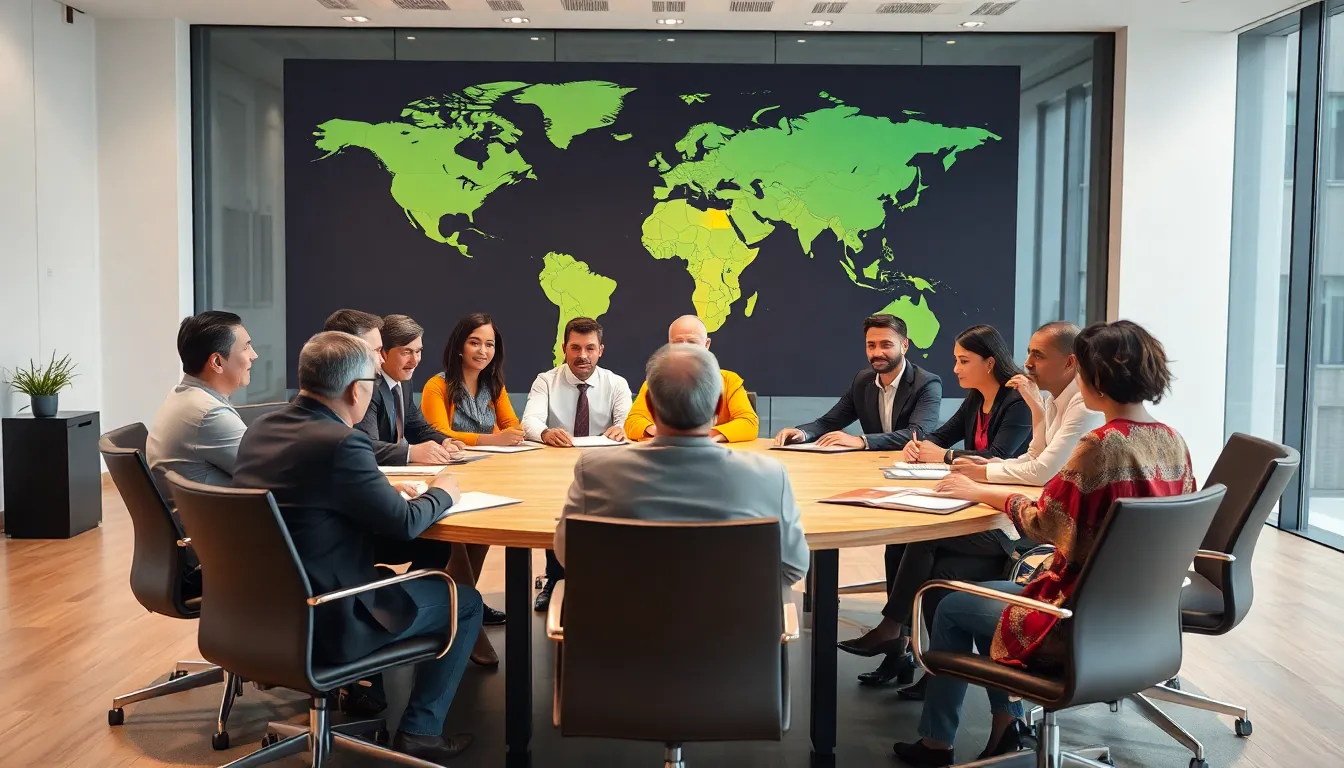Table of Contents
ToggleIn a world where borders blur and news travels faster than a cat meme, understanding global affairs has never been more crucial. It’s not just about what’s happening overseas; it’s about how those happenings affect everyday life, from gas prices to the latest TikTok trends. Global affairs encompass the intricate web of politics, economics, and social issues that connect nations and shape our shared future.
Imagine trying to solve a jigsaw puzzle with pieces scattered across continents. That’s global affairs in a nutshell! By grasping its complexities, one can navigate the challenges and opportunities that arise in our interconnected world. So buckle up and get ready to dive into the fascinating realm of global affairs, where every headline tells a story that impacts us all.
Understanding Global Affairs
Global affairs encompass the interactions among nations, organizations, and individuals on a worldwide scale. These interactions shape political, economic, and social landscapes across borders.
Definition of Global Affairs
Global affairs refer to the complex network of relationships and events that occur internationally, impacting global governance, trade, and development. This field includes diplomacy, international law, environmental issues, and humanitarian efforts. Participants include governments, non-governmental organizations, and multinational corporations, each playing a role in addressing global challenges. Issues like climate change and human rights violations emerge in discussions surrounding global affairs. Ultimately, understanding global affairs involves comprehending the factors that influence international cooperation and conflict.
Importance of Global Affairs
The significance of global affairs lies in its ability to inform citizens about worldwide events and their effects on local lives. International economic trends, such as inflation and trade policies, directly influence domestic industries and employment. Awareness of global conflicts shapes public opinion and policy decisions in numerous nations. Engaging with global affairs fosters a deeper appreciation for cultural diversity, promoting empathy and collaboration among different societies. Additionally, informed individuals can contribute positively to discussions on pressing issues, ensuring well-rounded perspectives in an interconnected world.
Key Components of Global Affairs

Global affairs consist of several key components that shape international interactions and influence everyday lives. Understanding these components offers insight into the complexities of our interconnected world.
Political Dynamics
Political dynamics stem from the interactions among nations, often driven by diplomacy and international relations. Nations engage in treaties, alliances, and negotiations to address global challenges. Regional conflicts can escalate into international disputes, affecting political stability. International organizations, like the United Nations, play vital roles in mediating these issues. Influence also arises from non-state actors, such as multinational corporations and NGOs, which impact policy decisions and public opinion. Addressing these dynamics aids in comprehending the political landscape of global affairs.
Economic Factors
Economic factors include trade, investment, and development issues that drive global interactions. Fluctuations in the global economy directly influence local markets and international relations. Countries rely on exports and imports to sustain economic growth, making trade agreements crucial. Financial institutions, like the International Monetary Fund, provide support and resources to stabilize economies across borders. Globalization impacts job markets, wages, and consumer behavior, highlighting the interconnectedness of economies. Understanding these factors enables individuals and nations to navigate economic trends that affect their lives.
Social Issues
Social issues encompass a range of topics, including human rights, migration, and health crises that transcend borders. Human rights violations lead to international outcry, prompting intervention and advocacy efforts. Migratory patterns affect both source and host nations, creating challenges and opportunities. Health issues, such as pandemics, require global cooperation to ensure public safety. Cultural exchange enhances understanding and addresses prejudice, fostering empathy among nations. Engaging with social issues deepens awareness of the complexities tied to global affairs.
The Role of International Organizations
International organizations play a crucial role in shaping global affairs. They facilitate cooperation among countries and address worldwide challenges.
United Nations
The United Nations (UN) serves as a primary forum for diplomacy and conflict resolution. Founded in 1945, it comprises 193 member states dedicated to promoting peace and development. Various agencies, like UNICEF and WHO, work on humanitarian issues, health crises, and children’s rights. The UN Security Council manages international peace and security by addressing conflicts through resolutions. This organization’s ability to convene nations fosters dialogue, helping to prevent escalations into wars through diplomatic efforts.
World Trade Organization
The World Trade Organization (WTO) governs international trade between nations. Established in 1995, it provides a platform for negotiating trade agreements, resolving disputes, and monitoring national trade policies. Tariffs and import quotas are among the key issues addressed by the WTO to facilitate free trade. By promoting a rule-based trading system, this organization enhances economic stability and growth. Member countries benefit from open markets, which in turn supports job creation and consumer choice globally.
Current Trends in Global Affairs
Global affairs continue to evolve rapidly, reflecting pressing issues that resonate worldwide. Two significant trends are climate change and global health issues.
Climate Change
Climate change presents a mounting challenge that affects nations indiscriminately. Rising temperatures impact agricultural productivity, leading to food insecurity across multiple regions. Coastal cities face threats from rising sea levels, prompting discussions on adaptation strategies. Shifts in weather patterns contribute to humanitarian crises, forcing communities to mobilize for disaster relief. Additionally, international agreements like the Paris Agreement foster cooperation among countries to limit greenhouse gas emissions. Enhanced urgency surrounds the need for renewable energy sources and sustainable practices to combat climate issues.
Global Health Issues
Global health issues demand immediate attention and collective action. The COVID-19 pandemic underscored vulnerabilities in public health systems, highlighting disparities among countries. Vaccination efforts showcased the importance of international collaboration, with organizations like the World Health Organization coordinating responses. Antimicrobial resistance poses an emerging threat, complicating treatment options for infectious diseases. Mental health has gained attention as a critical component of overall well-being, necessitating support systems across different cultures. As nations work together, addressing these health challenges becomes essential for global stability and prosperity.
Understanding global affairs is essential for navigating the complexities of today’s world. As international events increasingly shape local realities, being informed empowers individuals to engage meaningfully with pressing issues. The interconnectedness of politics, economics, and social matters requires a collaborative approach to address challenges like climate change and health crises.
By fostering awareness of global dynamics, individuals can develop a greater appreciation for cultural diversity and contribute to constructive discussions. This engagement not only enhances personal knowledge but also promotes empathy and cooperation among nations. Embracing the intricacies of global affairs ultimately paves the way for a more informed and connected society.




